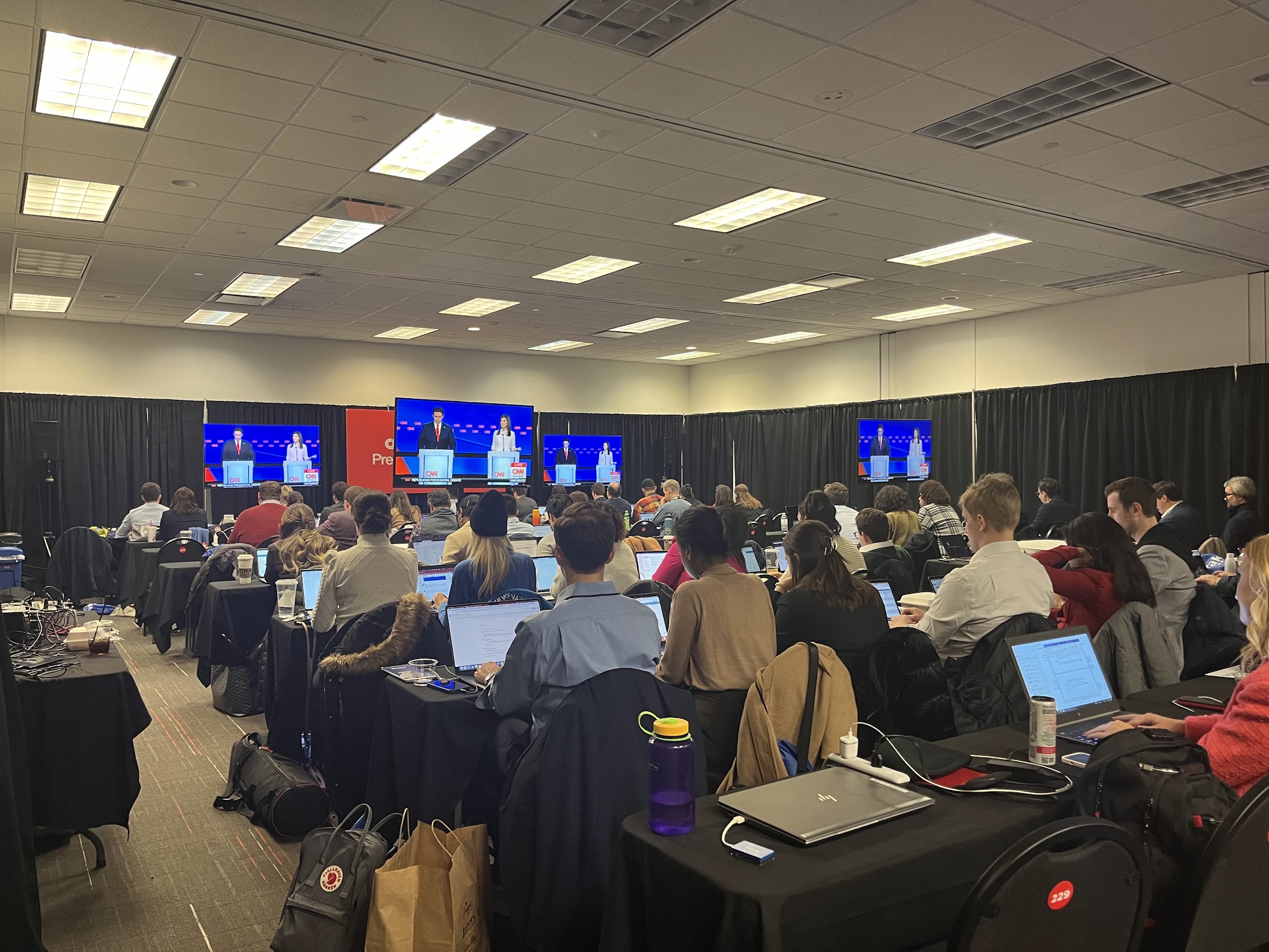
A Student Perspective:
The 2024 Republican Presidential Primary Debate
Jordan Phillips ('26)
Apr 24, 2024
It took just a quick Google search to find the email for CNN Debates. I was hoping to gain a credential to attend the January 10th Republican Presidential Primary debate between Nikki Haley and Ron DeSantis, so I sent a cold email to the generic email address asking if it was possible to get a pass. To my shock, CNN said yes. For one snowy Wednesday night in Iowa, I became a fully credentialed member of the press.

I posed these questions to a group of (real) journalists as I sat at the Drake University Starbucks on the morning of the debate. The people I talked to were fairly dismissive of any GOP nomination that didn’t include Trump and mirrored common public sentiment that this was a race for second place. They were also quick to express that second place meant almost nothing–not influence, not prestige, and not a vice presidency–in the age of a Trump presidency.
Though the journalists weren’t certain that there was a point to the campaigns at all, the campaign staffers I talked to were far more optimistic. One Haley team member spent a solid twenty minutes mapping out for me how the former ambassador had a legitimate path to victory. DeSantis’s team seemed quite eager to engage in a conversation that positioned the Florida governor as an option for VP. Both teams felt that the simple act of standing up to Trump was significant in itself, but after talking to nearly twenty staffers no one could concretely articulate exactly why this opposition mattered.

I settled into my seat in the Media Center as the debate was about to begin, having gained little clarity on my questions (is there ever clarity in politics?) but feeling fascinated by the spectacle of the event itself. Even if this would be rendered irrelevant in the history of the Republican party, I was having the coolest evening ever. I bumped into Anderson Cooper and Abby Phillip in the hallway. I talked with people from some of the largest news organizations in the world. I’d successfully infiltrated an event that I’d debated the importance of in PubPol 155–if that’s not the Duke Sanford experience, I don’t know what is.
The content of the debate itself was appropriately polarizing and ambiguous for this era of politics. Duke professor and New York Times contributor Frank Bruni summed up the debate best in his newsletter the next morning: “Complaints [about Trump] all but receded behind their furious, puerile and relentless attacks on each other. And that made neither political nor moral sense.”

As I descended upon the Spin Room with my fellow journalists for some post-game interviews, it became obvious that the loudest person in the room wasn’t Haley nor DeSantis nor the spin doctors vigorously defending DeSantisLies.com–it was Trump. The January 10th debate had the lowest viewership of any presidential debate in recent history, with a measly 2.6 million people tuning into the event. Nearly double that number watched Trump’s town hall airing at the same time that evening. Voters clearly weren’t particularly interested in providing a stage to two candidates that they felt were long shots, especially when the presumed candidate was more than happy to shout over his competitors’ noise.
The January debate would be the final one of the 2024 primary season, with DeSantis dropping out 11 days later and Haley following after Super Tuesday. It feels more important to consider the importance of intra-party opposition now that this opposition isn’t running for president. The evolution of campaign messaging and the adjustment of views to appeal to moderate voters are some of the best antidotes we have for a polarized political system. Haley and DeSantis engaged in this adjustment throughout their campaigns, hoping to attract a voter that felt unrepresented by another Biden-Trump showdown. Though neither candidate secured the GOP nomination, they did challenge the norm. When we ignore the diversity of ideology within political parties, even if that diversity is minuscule, we ignore a nuanced component of the solution to polarization. A tightly contested presidential race holds candidates accountable to adjusting in the face of nuance. Without a need to appeal to an undecided voter within a party, this nuance becomes a lost art.
Because the conversation on the long-term trajectory of the GOP and American democracy has significant implications, it ought to have far more than two voices. That starts with creating a stage for candidates to share their thoughts. For all of its perceived irrelevance, Iowa showed that this stage hasn’t completely disappeared, even if it needs to be significantly more visible.
This content does not represent the official or unofficial views of the Sanford School, Polis, Duke University, or any entity or individual other than the author.


